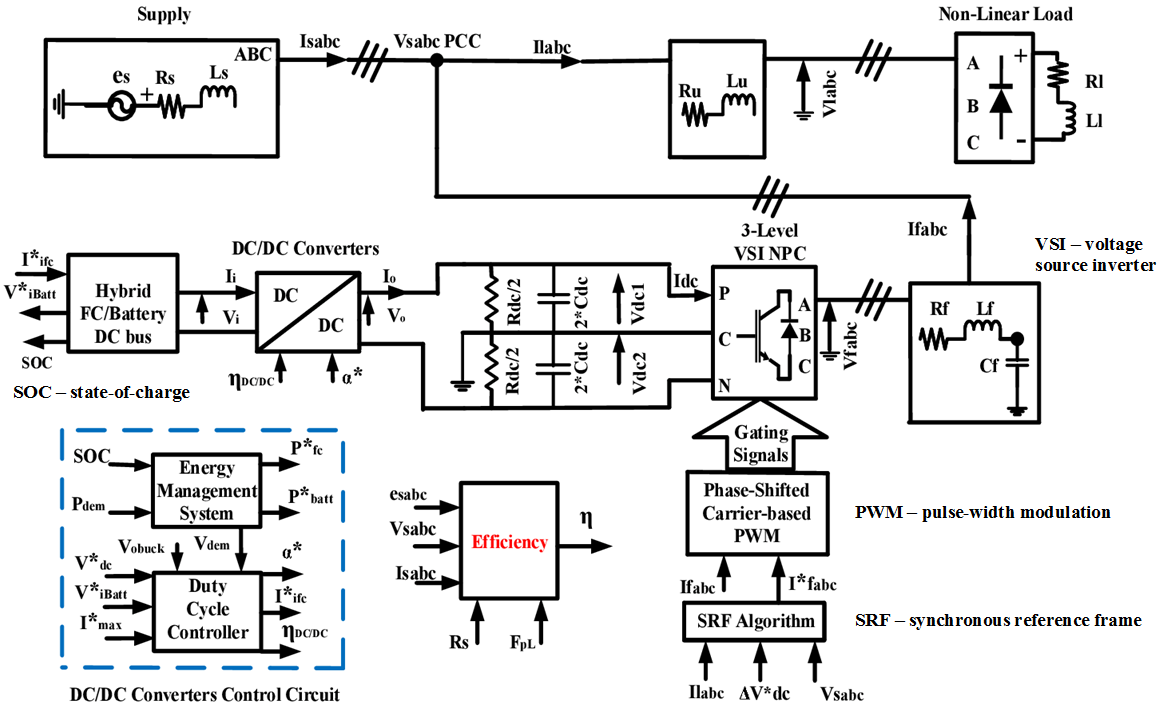Energy efficiency of a 3-level shunt active power filter powered by a fuel-cell / battery DC bus with regulated duty cycles
DOI:
https://doi.org/10.20998/2074-272X.2021.5.05Keywords:
3-level shunt active power filter, hybrid fuel-cell / battery DC bus, energy efficiency, power quality, efficiency, relative power lossesAbstract
Introduction. Nowadays, electrical energy is indispensable in industrial, tertiary and domestic appliances. However, its efficiency is becoming affected by the presence of the disturbances that appear in the electrical networks such as harmonics, unbalance, sags/swells, flickers …etc. Indeed, the disturbances cause a decrease in the power factor and an increase in the power losses. In this paper, the harmonic disturbance is considered and a 3-level shunt active power filter powered by a hybrid fuel-cell/battery DC is applied to mitigate current harmonic components from the electrical feeder. Aim. Studying the energy efficiency of a system based on a 3-level shunt active filter powered by a hybrid fuel-cell / battery DC bus. Methodology. It is a matter of finding the suitable formulas that express the efficiency and the relative power losses according to the load factor (which is the ratio between the short-circuit active power and the load active power) and the load power factor. The DC bus energy is controlled using an energy management algorithm that contributes in generating the required reference input currents and output voltages of the fuel-cell and the battery. The DC/DC converters control circuits are performed in a closed loop by means of regulated duty cycles. Results. The simulation results carried-out under MATLAB/Simulink environment show better filtering quality if compared with the case of open loop control of the DC/DC converters and lesser differences between the fuel-cell power, the battery power and their respective reference powers. Which concerns the energy efficiency, the results demonstrate that higher efficiency and lower relative power losses can be achieved only when higher load factor and load power factor are attained. Therefore, the compensating system of the power factor is very important to improve the energy efficiency.
References
Sumper A., Baggini A. Electrical Energy Efficiency: Technologies and Applications. John Wiley & Sons, Ltd, 2012. 402 p. doi: https://doi.org/10.1002/9781119990048.
Kuznetsov V., Tryputen N., Kuznetsova Y. Evaluating the effect of electric power quality upon the efficiency of electric power consumption. 2019 IEEE 2nd Ukraine Conference on Electrical and Computer Engineering (UKRCON), 2019, pp. 556-561. doi: https://doi.org/10.1109/ukrcon.2019.8879841.
Toader C., Postolache P., Golovanov N., Porumb R., Mircea I., Mircea P. Power quality impact of energy-efficient electric domestic appliances. 2014 International Conference on Applied and Theoretical Electricity (ICATE), 2014, pp. 1-8. doi: https://doi.org/10.1109/icate.2014.6972627.
Montano J.-C., Salmeron P., Thomas J.P. Analysis of power losses for instantaneous compensation of three-phase four-wire systems. IEEE Transactions on Power Electronics, 2005, vol. 20, no. 4, pp. 901-907. doi: https://doi.org/10.1109/TPEL.2005.850956.
Rajalakshmi R., Rajasekaran V. Improvement of energy efficiency through power quality by the compensation of harmonics with shunt active power filter. 2011 International conference on recent advancements in electrical, electronics and control engineering, 2011, pp. 324-327. doi: https://doi.org/10.1109/ICONRAEeCE.2011.6129820.
Artemenko M.Y., Batrak L.M. The new formula for apparent power and power losses of three-phase four-wire system. 2017 IEEE 37th International Conference on Electronics and Nanotechnology (ELNANO), 2017, pp. 389-393. doi: https://doi.org/10.1109/ELNANO.2017.7939784.
Artemenko M.Y., Batrak L.M., Polishchuk S.Y., Mykhalskyi V.M., Shapoval I.A. The effect of load power factor on the efficiency of three-phase four-wire power system with shunt active filter. 2016 IEEE 36th International Conference on Electronics and Nanotechnology (ELNANO), 2016, pp. 277-282. doi: https://doi.org/10.1109/ELNANO.2016.7493067.
Artemenko M.Y., Batrak L.M., Domaskina N.I. Apparent power of three-phase four-wire system in sinusoidal asymmetric mode and energy effectiveness of shunt active filters. 2015 IEEE 35th International Conference on Electronics and Nanotechnology (ELNANO), 2015, pp. 469-474. doi: https://doi.org/10.1109/ELNANO.2015.7146952.
Bourouis B., Djeghloud H., Benalla H. An innovative algorithm for a hybrid FC/battery system energy management. Electrical Engineering & Electromechanics, 2020, no. 6, pp. 35-44. doi: https://doi.org/10.20998/2074-272x.2020.6.06.
Bourouis B., Djeghloud H., Benalla H. Three-Level NPC Shunt Active Filter Powered by a Hybrid Fuel-Cell/Battery DC Bus Voltage. 2021 18th International Multi-Conference on Systems, Signals & Devices (SSD), 2021, pp. 330-339. doi: https://doi.org/10.1109/ssd52085.2021.9429308.
Ladoux P., Olle G. Compensateur d’harmoniques et de puissance réactive. RESELEC Publ., 2002. 45 p. (Fra). Available at: https://eduscol.education.fr/sti/sites/eduscol.education.fr.sti/files/ressources/techniques/3877/3877-compensateur-harmoniques.pdf (accessed 12 March 2021).
Available at: https://www.brusa.biz/portfolio/bdc546/?lang=en (accessed 12 March 2020).
Motapon S.N. Design and simulation of a fuel cell hybrid emergency power system for a more electric aircraft: evaluation of energy management schemes. PhD Thesis Presented to École de Technologie Supérieure, Montreal, March 2013. Available at: https://www.proquest.com/docview/1501641145 (accessed 12 March 2021).

Downloads
Published
How to Cite
Issue
Section
License
Copyright (c) 2021 B. Bourouis, H. Djeghloud, H. Benalla

This work is licensed under a Creative Commons Attribution-NonCommercial 4.0 International License.
Authors who publish with this journal agree to the following terms:
1. Authors retain copyright and grant the journal right of first publication with the work simultaneously licensed under a Creative Commons Attribution License that allows others to share the work with an acknowledgement of the work's authorship and initial publication in this journal.
2. Authors are able to enter into separate, additional contractual arrangements for the non-exclusive distribution of the journal's published version of the work (e.g., post it to an institutional repository or publish it in a book), with an acknowledgement of its initial publication in this journal.
3. Authors are permitted and encouraged to post their work online (e.g., in institutional repositories or on their website) prior to and during the submission process, as it can lead to productive exchanges, as well as earlier and greater citation of published work.




